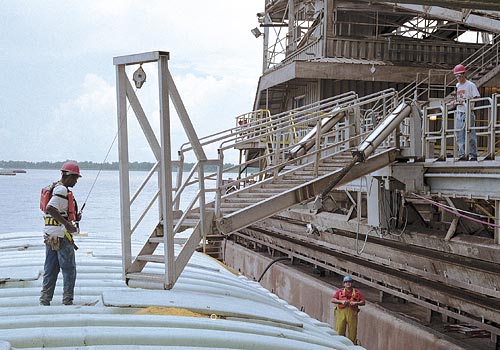 Falls and drowning are always concerns when it comes to employee safety in longshoring and marine terminals. But several factors make marine safety particularly challenging, including the constant motion of ships and barges.
Falls and drowning are always concerns when it comes to employee safety in longshoring and marine terminals. But several factors make marine safety particularly challenging, including the constant motion of ships and barges.
Here are six factors that could impact safety when loading and unloading products at a marine facility:
1. Falls On The Dock Or Vessel
When workers are using marine ladders or other equipment to get on or off the vessel, there’s always risk of falling onto the dock, ship or barge, or into the water itself. These falls are often the result of tripping or slipping. For example, a worker may trip on hoses and fall into a barge that’s being loaded with grain, or slip on a liquid product that has spilled during the loading process.
2. Variations In Water Height
Tides and seasonal changes create large fluctuations in the height of the water, as well as the height of any vessel floating upon it. The degree of fluctuation depends on a variety of factors, including whether your site is on a river or the ocean and the shape of the coastline.
According to the National Ocean Service, the world’s highest tides are found in the Bay of Fundy, which includes New Brunswick. At certain times of the year, the difference between high and low tide is 53 feet – more than a three-story building. Your marine safety equipment must be able to accommodate the changing height of a ship while it’s in port.
3. Risk Of Drowning
When employees are working over or near water and there’s a danger of drowning, they’re required to have U.S. Coast Guard-approved life jackets or buoyant work vests, among other marine safety regulations. Despite these regulations, some workers still fall into the water and drown due to lack of functional life jackets, life rings, other safety equipment, water currents and debris in the water.
4. Poorly Trimmed Vessels
A ship or barge is always in motion to some degree, while the loading dock is stationary. The ropes connecting the two are particularly vulnerable, and a poorly tied off (or “trimmed”) vessel introduces several marine safety issues.The correct tension in the ropes must be carefully maintained. Lines that are too tight could snap, resulting in a runaway ship. Lines that are too loose result in excessive movement, which could potentially break the loading arm, ladders and other equipment connecting the vessel to the dock. Apart from the dangers to personnel, this type of break may result in chemicals or other products falling into the water.
5. Environmental Contamination
In addition to marine safety concerns about your employees and equipment, you also have to worry about contaminating the water. The hydraulic systems used for loading arm equipment could leak fluid into the water, for example, or the cargo itself could fall into the water during the loading or unloading process.
Whatever the cause of the contamination, introducing a foreign substance into the water may result in stiff penalties from the Coast Guard as well as local municipalities.
6. Extreme Weather
Depending on your geographic region, the safety of your marine site may be affected by storms and high winds, rain, sleet and snow – or even tsunamis and earthquakes. Harsh marine conditions are particularly dangerous for workers and equipment. Wet or icy docks and ramps could increase the risk of falls, for example, while strong winds could wrench and damage loading equipment. Taking the appropriate precautions begins with researching the historical weather patterns in the area.
To improve safety and efficiency under these conditions, your company needs a well-designed safety solution. The first step in choosing the proper solution is to find a consultant who takes the time to learn your business and who understands the unique challenges and requirements of a marine work environment.
Need to improve marine safety? Click below to download this industry guide from Carbis Solutions to discover strategies for a safer, more efficient workplace.



